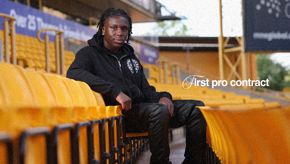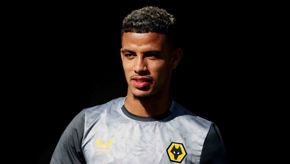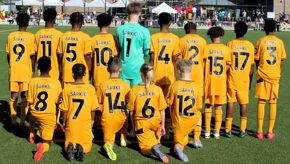The former Leyton Orient, Peterborough United and Bohemians midfielder has been Head of Academy Sports Science at Wolves for the past five years, turning the department into one of the best in the country following his arrival into Compton.
As well as being the man in charge with overseeing the sports science provision for the whole of Wolves’ youth system, Dave also works closely with the under-23s to make sure the development side of the club is as progressive as possible.
“On a day-to-day basis, I manage the sports science department and make sure all my members of staff are delivering the Academy performance plan as well as they can,” Dave explained. “While I work with the under-23s myself, looking after their field-based and gym-based conditioning.
“At the start of each day I carry out well-being questionnaires with the players and from that we make a decision about whether they train, whether they part train, or whether they have a recovery day; keeping track of that to see if there’s any trends.
“I also take the players for their pre-activation sessions in the gym during the mornings, where each player is given around six to eight different exercises for them to work on. This is the time we will carry out fitness testing, health screenings, or spend time on any weaknesses that we found out on the pitch – a quick feet drill or a reaction drill, for example.
“That session also involves a lot of stretching so we can activate their muscles before we go out onto the training ground. While on the pitch I will lead the warm-ups, with each session attempting to mimic what the coaches will be focusing training on to try carry on the movement patterns they will be using in training – both physically and mentally preparing them during their warm-ups. We also do extra conditioning training with the players after training who don’t reach their GPS targets.
“A lot of our gym work with the under-23s now involves functional strength work as we try to mimic the movements that they would make in games and include weights into that.”
The importance of sports science in football has been greatly recognised over the recent decades, and Dave puts this down to the higher intensity that surrounds the modern game, as well as players becoming better all-round athletes to generations gone by.
He said: “Sports science is very important to players in the modern game as they seem to be a lot more explosive and high intensity athletes. Comparing it back to my day, and the time before that, you’d only find one or two really athletic, speed orientated players. They were more endurance based and all about trudging through the mud and a repeat, repeat, repeat attitude.
“Now you will find a lot of players are more explosive, very quick and that element takes it out on the body.
“Having specialists within that area, it allows the sports scientists to train the player in the correct way, so you wouldn’t predominantly work on endurance exercise, you work more on eccentric strength, hamstrings – so they’re able to cope with the high intensity exercise.
“The knowledge of how to train a player and get them used to matchday and training, it’s all about giving the manager player availability.
“Our target throughout the season is to have above 92 per cent of the players on the training field for the manager to work with on a daily basis. Exercises in the gym, the pre-activation, is all sports science and physiotherapy led and with our knowledge we try to give the players the correct knowledge which will allow them to cope with the demands of training and gameplay.
“In today’s game, the sports science and physiotherapy role are vital in the cog. The coaches need to have the players out on the training ground to be able to prepare them for the game, which is the be all and end all.”
During his time as a professional footballer, Dave suffered a catalogue of serious injuries, meaning he was spending the majority of his time in the physiotherapists room, where his love for sports science was formed.
Dave said: “I had a keen interest in football. I did a part-time YTS at Nottingham Forest while I was doing my A levels, but I didn’t quite make it at Forest. While at university I played for Chelmsford City, before turning professional at 19 when I signed for Peterborough United.
“I had three years at Peterborough before they sold me to Leyton Orient where I had three-and-a-half years down there, before I spent just under five years at Bohemians which took me up to about 31.
“Through that time, I had some serious injuries and was the reason I retired so early. I had cruciate injuries, I broke my leg and some other serious health issues, pulmonary embolisms after I took a knock in the chest.
“During this time, I spent a lot of time in the physiotherapist rooms and a lot of time working with the sports scientists, which is where my interest in the fitness side of things came from. I spent time speaking with them, expanding my interest in sports science, so in my last year as a footballer I started a sports science degree through the Professional Football Association (PFA).
“When I retired, I went back to being a full-time as a student alongside playing conference football at several clubs in the West Midlands – Kidderminster Harriers, Tamworth, Moor Green and Solihull Moors.
“After graduating I stayed on to do my Masters degree, before spending four years at Swindon Town as head of sports science with the first-team. We missed out on promotion in the play-off final at Wembley and Danny Wilson went the Sheffield United and took me with him.
“I had two years at Sheffield United as head of sports science and when we missed out on promotion to the Championship there after getting beat 11-10 on penalties to Huddersfield, before reaching the semi-finals of the play-offs the following year. After Danny left, a new manager came in and the inevitable happened as I lost my job there.
“I did my master’s degree at Wolverhampton University with Tony Daley. I’d bumped into him once or twice as a player but got to know each other well on the course and how my job at Wolves came about, as the club was advertising for a head of sports science at the Academy and told me to apply for it.”
Since arriving to Wolves, Dave has transformed the sports science department, expanding his team of staff and developing a plan which can enhance the provision throughout the whole of Wolves Academy to make the players as fit as possible.
He added: “When I arrived at the club there was myself as the head of department, John Fenners – who looked after the sports science provisions for most of the academy, spread across from under-8s all the way up to the under-18s, but predominantly the under-18s, and also had a university student working part-time.
“My main goal and main emphasis when I first arrived was to build a department which would improve the provision we provide all our young players here at Wolves.
“To do that I’ve built up the relationship we’ve had with the University of Wolverhampton, our main Academy sponsor, and during this time, I had to develop a philosophy around how our young players should grow and develop throughout our Academy system, from under-8s all the way up to the under-23s.
“This meant designing a whole programme on how we see them developing in their movement patterns, strength, speed and agility, linking it in with the philosophy that we have at the club. This took the first six to eight months of my time at Wolves to do.
“In my second year we had three full-time members of staff and two MRes students from the university, who were then both offered full time roles; one of them now being Tom Male, the first-team’s GPS analyst – who’s shown how good his is at his job and has gained the trust of Nuno and his management team – and Shaun Miller, our under-15s and under-16s sports scientist and lead sport scientist.
“We’ve continued to develop over the years and now have a department which has four full-time sports scientists who work with the under-23s to under-13s, two GPS analysts, and supported by two MRes students, taking the department from strength-to-strength.”












